
Female Rage & Romance
I would say that my romance reading has encompassed about a little over a decade of my life. And measuring that amount of time admittedly makes me feel older than my twenty-seven years. Recently, I read, loved, and re-read A Promise of Fire by Amanda Bouchet. I’ve been gushing about it nearly everywhere and it’s my favorite book so far of 2016. I’m willing to say that once this year ends, it’ll still be the best book I’ve read.
After re-reading it, I’ve been trying to figure out what about the book I loved so much. Sure, it has a great blend of fantasy and romance. The elements of Greek mythology were a siren’s song to my nerdy heart. The pacing was fantastic and Bouchet does a terrific job of giving you these little mysterious slips of details to keep you wanting more. But I think I’ve narrowed it down why A Promise of Fire knocked my socks off.
The heroine.
More specifically, the heroine’s anger.
For some spoiler-free background about A Promise of Fire’s heroine, Cat, she has a traumatic past she’s hiding from. She’s also a Kingmaker, a being born every few hundred years who has the innate ability to tell whether or not someone is lying. She can also use magic. You can understand why 1) she’s a badass and 2) why someone would want to use her for their own gain.

It’s a tall order.
When readers first meet Cat, she’s been on her own for years now and in her early-twenties. She’s independent and fierce. Frankly, she’s a bit of a badass.
But man, does she let her anger get the best of her and I loved every second of it because she wasn’t some paragon of virtue. Her morals were grey at times. Her motives – selfish. I can’t remember reading a more complex and flawed heroine.
I’m not saying heroines in romance are flawless individuals, but I rarely see them so conflicted and so full of rage. Their issues could be insecurities, trying to get over a past trauma, or dealing with new environments and new experiences. Sometimes, they’re shy. Sometimes, they’re brash. Heroines come in all shapes and sizes with a wide variety of motivations, though I’ve rarely read a heroine who has been borderline vicious.
Cat isn’t necessarily motivated by revenge at first, but as she makes friends and falls in love, she realizes that she can’t fight her origins forever. She’ll need to fight. And fight she does. Cat literally melts faces and burns the arms off of people unwilling to her her cause.
It’s a jarring thing to read because you’re supposed to root for the heroine. She has to be someone readers respect or at least like. I can’t remember the amount of books I’ve read where it’s hard to muster up enough energy to care about the either of the main characters because they’re either too boring or they’re just so awful and rage-inducing that you could care less about them getting a happily ever after. (Reminder: life is too short to finish bad books.)
But it’s also jarring because women aren’t supposed to be angry. We’re supposed to smile. We’re supposed to be agreeable. A woman’s anger makes people uncomfortable.
The Huffington Post reported on a study done by researchers at both the University of Arizona and the University of Illinois at Chicago on how people perceive anger from men and from women. A mock-jury scenario was created with the research subjects where they had to debate the outcome of a murder trial. In different scenarios, a dissenting juror would either be a man or a woman. In the case of a woman, if she used anger, the other jurors were less likely to be influenced by her point of view. In fact, the other jurors became more sure of their convictions in sentencing. If it was a male juror expressing the same anger and indignation, jurors were more likely to question their own decisions rather than challenge the male juror’s. In the case of this particular study, a woman’s anger reduced her credibility when making her point.
Psychology Today has some additional information about the study if you’re curious, though maybe have a soothing drink at hand. Like some calming tea or a strong shot of whiskey. Your choice.
Anger is completely normal. Everyone experiences from time to time, so why is it only acceptable for men to express said anger? And also, think of how much havoc all of that repressed anger can cause on a person? Having to keep Cat’s level of grief and hurt and mistrust at how she was raise and treated would be enough to drive anyone crazy. But she often wars with herself at how she expresses her anger.
If she explodes, will her newfound lover view her differently? Will her friends fear her, wary of any next outburst? Or will they diminish her emotions, thinking she’s overreacting? And when her anger does get the best of her, how badly will she lose it? Will she become like those monsters who taught her to embrace hate over love? Will her anger be something that consumes her?
I will say that none of these questions are answered in A Promise of Fire. Cat’s past and its affect on the future is still being unraveled; the next book isn’t out until January 2017.
Female rage is something that tends to be prevalent in other genres, namely mystery/thriller. With the popularity of Gone Girl, we’ve had a slew of other books with female protagonists subverting the victim role in thrillers. And granted, many authors are playing with typical tropes in romance, though why is the angry, scorned heroine exiled to a plot where there’s a crime needing to be solved?
I truly think that A Promise of Fire, right now, is in a league of its own. Not only does the heroine have to learn to live with her anger and how to express it, but she’s also the character that needs the most healing. A majority of the time in romances, we see the broken, tortured hero with a chip on his shoulder, a man thinking himself not worthy of love because of some past deeds.
Here, Cat steps into that role. She’s done things she’s not proud of, whether because of her misguided and traumatic upbringing or because she’s feeling threatened (see earlier face melting comments). Physically, she’s extremely powerful and it paints an amazing parallel to anger because a woman’s anger (and any anger really) is an incredibly powerful emotion to both feel and express.
While I love the romance genre (it’s most of what I read), I often feel torn in its advocacy. On one hand, romance has some really great progressive morals like sexual liberation. Many romance novels are about women becoming comfortable with their bodies and with sex in particular. But on the opposite side, there’s still this very conventional and oftentimes regressive way of viewing women, that their happiness or self-confidence or self-discovery is usually at the hands of a man. It’s through his love that she begins to value herself.
There’s also the concept of minimization. In our daily lives, women struggle with feeling minimized. Manspreading on the subway has our body contorting and folding in on itself. Our emotions have to be tempered and even-keeled, lest we’re labeled unhinged or crazy. Our facades have to pleasant, always smiling. And sometimes, I feel that often a heroine’s presence in romance or her role is for the benefit of the hero, rather than the other way around. The hero is the tortured one. The hero is the baggage. The hero insists that he’ll never love again.
All things tough and ugly and difficult and traumatic (with the exception of rape, but rape and sexual assault as a common backstory are a topic for another day), are attributed to the hero. And frankly, that’s bullshit. Women go through the same emotions as men, the only catch is the stigma related to expressing those emotions, which—let me tell you—can lead to some pretty expensive therapy bills.
Meanwhile and especially in historically-set romances, there’s such an emphasis on purity and virginity. One sexual encounter will give way to your soulmate because god forbid a heroine finds out what sort of sex stuff she likes before she meets the hero. Heroines are the healers of the battered and broken hero, they’re the soft touch he needs to realize he’s worthy of love.
I think one of the main reasons why the onus of ugliness, shall we say, is placed on the hero, is that a heroine has to be likable. Too often I read reviews where the heroine is too “bitchy” or “bossy.” Some readers prefer not to pick a romance where the heroine references past sexual partners or if there’s someone else successfully vying for the heroine’s attention apart from the hero. It’s hard to be a romance heroine with all the boxes the have to be ticked. And it’s entirely possible that through internalization, we’re conditioned to see angry, vengeful heroines as discomfiting rather than brave. Not intentionally, of course, but even on a personal level, I know I have a hard time expressing my anger or discomfort.
But with fiction, authors can do anything. There’s no sense not to have a heroine who embraces her darker side, who isn’t worried about giving people a piece of her mind, who isn’t afraid to harness her anger as part of her journey for self-fulfillment. Romance definitely has an issue with representation. Obviously, there’s a diversity problem in romance, but there are few stories where I feel modern, contemporary women are represented. Or at least heroines who reflect my own thoughts and emotions. Heroines who deal with crippling depression or who are prone to bursts of angry tears, women who have every reason to cry and scream.
At the end of an incredible essay in the New York Times entitled “Who Gets to Be Angry?”, Roxane Gay says:
But anger is not an inherently bad thing. Most of the time, it is a normal and even healthy human emotion. Anger allows us to express dissatisfaction. It allows us to say something is wrong. The challenge is knowing the difference between useful anger, the kind that can stir revolutions, and the useless kind that can tear us down.
And I think revolutions can be big or small. Both, in Cat’s case. She has the chance to tear down or lift up kingdoms with her abilities, especially if they get the best of her. But she also needs to come to terms with the war raging inside her. We all do, quite frankly. And I think the more we see heroines who struggle with those same less than ideal emotions that actual people struggle with, it might be easier for readers to feel that same acceptance within themselves. I know I can’t be the only one who wants more take-no-prisoners heroines who need to deal with their own demons.
Granted, A Promise of Fire was dark at times and pretty full of violence (often at the hands of the heroine), but I think we’ve all experienced a bit of darkness in our lives and from romance, I want more heroines dealing with that darkness – that anger, that depression, that need to escape that monstrous things that we could become. Because honestly, what’s more deserving of a happy ending.
Also as a note, for some great further reading on the subject, check out Broadly’s “History of Female Anger.”














